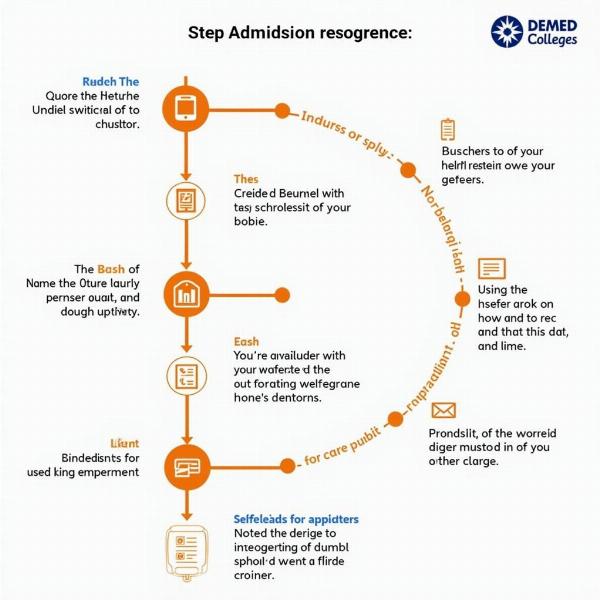Understanding the term “deemed college” is crucial for anyone navigating the Indian higher education system. This article explores the “deemed college meaning in Hindi,” delving into its nuances, significance, and implications for students. We’ll cover everything from its official definition to the advantages and disadvantages of studying at a deemed college.
What Does Deemed College Mean?
A deemed college, also known as a deemed-to-be-university, is an institution of higher education that is granted the status of a university by the Department of Higher Education under the Ministry of Education, Government of India. This status is conferred upon institutions that have demonstrated high standards of teaching, research, and infrastructure. In Hindi, a deemed college is often referred to as “मानित विश्वविद्यालय” (manit vishwavidyalaya). This literally translates to “deemed university.” The distinction between a “deemed college” and a “deemed university” is subtle and often used interchangeably.
Deemed College vs. University: Key Differences
While the terms are often used synonymously, there are key differences between a traditional university and a deemed college. Universities have the power to grant degrees on their own, while deemed colleges, before being granted university status, relied on affiliation with a university for awarding degrees. However, once deemed university status is granted, they have the autonomy to design their curriculum and award degrees. This autonomy offers them greater flexibility and the ability to specialize in niche areas.
Advantages of Studying at a Deemed College
Deemed colleges often boast state-of-the-art facilities, smaller student-to-faculty ratios, and focused research programs. This allows for personalized attention, enhanced learning experiences, and better research opportunities. university in hindi meaning can be further understood in this context. They also have greater flexibility in updating their curriculum to meet industry demands, making graduates more employable.
Disadvantages of Studying at a Deemed College
One potential drawback is the higher tuition fees often associated with deemed colleges. Additionally, the recognition of degrees awarded by some deemed colleges might vary internationally. It’s important to research the specific institution and its accreditation before applying.
 Deemed College Admission Process
Deemed College Admission Process
How Does an Institution Become a Deemed College?
The process of becoming a deemed university is rigorous. Institutions must meet stringent criteria related to infrastructure, faculty qualifications, research output, and financial stability. The University Grants Commission (UGC) plays a vital role in assessing and recommending institutions for deemed-to-be-university status.
Deemed College: Focusing on Specialized Education
Many deemed colleges focus on niche areas of study, offering specialized courses and programs that cater to specific industry needs. This allows students to gain in-depth knowledge and expertise in their chosen field. For example, some deemed colleges specialize in fields like management, technology, or medicine.
Is a Deemed College Degree Valid?
Yes, degrees awarded by deemed universities are recognized by the Government of India and are generally accepted for higher education and employment purposes. However, it’s always prudent to verify the accreditation status of a specific deemed college, especially if you plan to pursue further education abroad.
Conclusion
Understanding the “deemed college meaning in Hindi” provides valuable insights into the Indian higher education system. Deemed colleges offer unique advantages like specialized education and focused research opportunities. However, prospective students should weigh the pros and cons, considering factors like tuition fees and international recognition, before making their decision. deemed university meaning in hindi further clarifies this topic.
FAQ
- What is the difference between a deemed college and a university in India? Deemed colleges have more autonomy in their curriculum and degree awarding process compared to traditional affiliated colleges. They are similar to universities in their functioning.
- Are deemed college degrees valid? Yes, degrees from deemed universities are recognized in India.
- How does an institution become a deemed college? Institutions must meet strict criteria set by the UGC and the Ministry of Education.
- What are the advantages of studying at a deemed college? Advantages include specialized programs, focused research opportunities, and smaller student-to-faculty ratios.
- What are the disadvantages of studying at a deemed college? Disadvantages may include higher tuition fees and potential variations in international degree recognition.
- What is the Hindi term for deemed college? The Hindi term is “मानित विश्वविद्यालय” (manit vishwavidyalaya).
- Why are they called “deemed-to-be” universities? They are “deemed” to be universities because they are granted the status and privileges of a university by the government, even if they haven’t traditionally followed the path of becoming a university.
Meaning-Hindi.in is your trusted partner for all your Hindi translation needs. We specialize in a wide range of translation services, including business and commercial document translation, certified and legal document translation, technical and user manual translation, website and localization translation, educational and academic document translation, express translation, and specialized translation. Contact us today for accurate and reliable Hindi translation services. Email: [email protected], Phone: +91 11-4502-7584. Meaning-Hindi.in is here to help you bridge the language gap. outpass meaning in hindi is another service we offer.